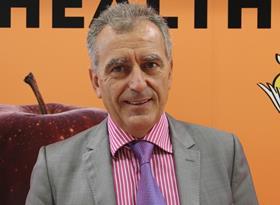
You became CEO of Groupe Pomanjou in March last year. What goals have you identified for the company? Are new markets a big part of your future strategy?
Marc Rauffet: My job as CEO is to prepare for the future. Naturally, Asia is a part of the group’s strategy. We have been mostly dedicated to apples for a generation, with Europe being the main market. But this is not enough for the future. We want to develop on the Asian market as a company with its own unique varieties – that is how we want to be seen there.
Is China the number one target on account of its size?
MR: It is not because there are 1bn people living in China that we are interested in this market; it is because there are 50m people there who want and can afford a traceable, environmentally friendly apple. It is still not a very mature market. There are a lot of importers and wholesalers, and the retailers are not very well coordinated with their chains. So we don’t expect huge growth immediately, but we expect to progress significantly. Around 5 per cent of our exports are now sent to China.
Has the Russian ban on EU and US apples influenced your approach? Has it increased your desire to look at markets outside of Europe?
MR: The Russian ban has had a big impact on the European apple market, so a lot of European marketers are looking for alternative markets. But the Polish exporters all do Gala, the Moldovans all do Gala, the UK exporters all do Gala – anyone can come to Asia and sell Gala. The way we differentiate ourselves is by offering excellent varieties that are owned by us, such as the exclusively organic Juliet apple. This variety is really appreciated in Asia, especially in Taiwan, Singapore and Thailand. The growth has been incredible, far more than we expected. And we now hope other markets like Malaysia, Hong Kong and China will open up lines.
What about Honeycrunch?
MR: Honeycrunch is a very juicy, sweet, larger-sized apple. Each country in Asia has its own particular demands, but large fruit is generally popular. Honeycrunch is a niche variety – we don’t expect it to shift huge volumes – but it responds to a specific demand. Honeycrisp succeeded in changing the face of apples in the US market. If you look at the growth of Gala, Fuji and Honeycrisp, the latter curve is far more impressive. The big increase was down to a change of philosophy on the part of the exporter: from a “produce and then sell” approach to a “produce according to the demand” strategy. Since demand is higher than supply, it sells for four to five times more than an average apple.
What do importers and retailers make of this approach?
MR: I have spoken to retail buyers in the Middle East about the need to offer more variety, both in terms of fruit and prices. Everyone can afford apples – so why sell them all so cheap? You don’t see this with chocolate bars. A good supermarket shelf offers a variety of different prices for a variety of different apples. If they are the same price, the consumer is lost and buys only what he or she already knows.
Do you think retailers in Asia and the Middle East understand this particular logic?
MR: Tesco in Thailand, Walmart in China, Carrefour in the Middle East – these companies understand what’s coming next, and their reputation depends on it. 25 years ago, we were sending only to the UK. When Tesco and Sainsbury’s began demanding full traceability, we weren’t too happy, thinking that we knew our job better than anyone else, but now we are very grateful. We progressed a lot as a company as a result. And now certificates like GlobalGAP are standard.
So what do you see as the answer? Is there the demand for the kind of niche varieties that you offer?
MR: Fruit is a push product. You need to get people to taste it, and you need to explain to them why it’s superior. Our staff are better paid in France than elsewhere in the world, so we struggle to compete with other countries on price. We have to offer good varieties and combine that offer with good marketing. We also supply Red Delicious and Gala, but at the same time we have Pink Lady, which has been a real success. What you need is a good story that goes all the way from the tree to the customer and which offers full transparency and makes particular guarantees on the use of chemical products, environmental sustainability and the fair treatment of employees. These are not things that many customers ask for, but this is what we see happening in the coming decade – and you need to work on this process for a long time to make it efficient.



